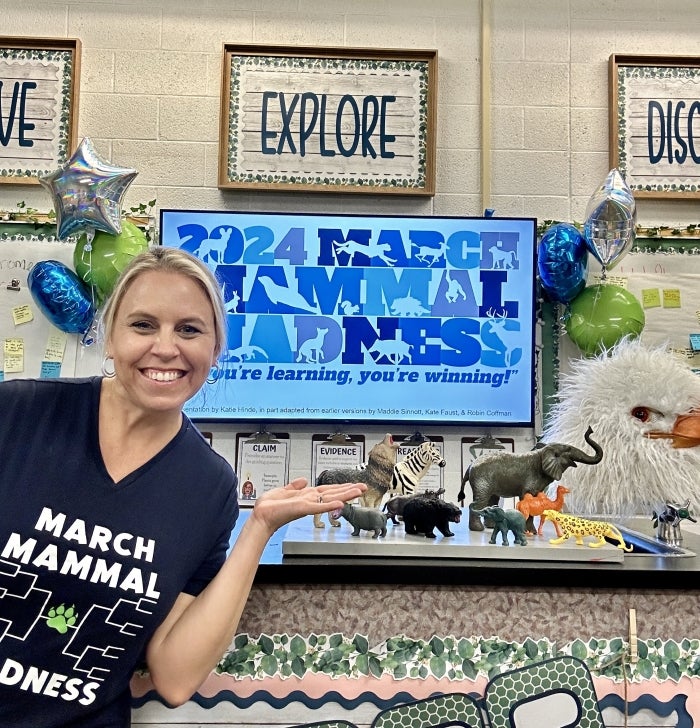March Mammal Madness hypes science, storytelling in the classroom and beyond

A painting of striped hyenas and golden jackals by Wilhelm Kuhnert (1865–1926) via Wikimedia Commons
In classrooms throughout the country, the buzz around March Mammal Madness starts long before the tournament begins. For middle school science teacher Jessica Harris, students wonder which animals will be selected in the annual nature-based simulated competition.
“MMM has become a beloved tradition at my school. Because I teach three grade levels, students experience it multiple times, deepening their understanding of ecosystems, animal adaptations and human impact year after year,” said Harris, who teaches grades six through eight at Summit School in Phoenix.
Founded in 2013, the MMM tournament is styled after the NCAA College Basketball March Madness. MMM weaves research and science in a storytelling format that engages players, learners and educators every year.
“MMM creators ... make complex science fun and digestible, bringing scientific inquiry to life for students and the broader community,” Harris said. “My entire school participates, from elementary students filling out class brackets to staff members — including our head of school — joining in the fun. By the time students reach middle school, they already have a sense of what MMM is all about, and we take it to the next level by incorporating deeper research and NGSSNext Generation Science Standards are K–12 science content standards that set the expectations for what students should know and be able to do. The NGSS were developed by states to improve science education for all students. science standards.”
2025 marks the 10th tournament since Arizona State University Regents Professor Anne Stone launched the Genetics Team within MMM, which is recognized in this year’s theme.
“Professor Stone works with an amazing group of scientists who study genes, genomes and evolution across the tree of life. Serendipitously, with MMM’s theme to celebrate the tree of life, 2025 marks the 100th anniversary of the Scopes Monkey Trial about the teaching of evolution in public school,” said Katie Hinde, associate professor in the School of Human Evolution and Social Change and the Center for Evolution and Medicine at ASU. Hinde is also the founder and editor-in-chief of MMM.
The 2025 bracket, released on Feb. 20, is available on the ASU Library’s MMM Library Guide. MMM is free for anyone to play and all materials are available as open educational resources, making it easy for educators to download lesson plans and customize them to meet the needs of their students.
“After the absolute chaos of non-mammals in every division in 2024, only one mammal made it to the Final Roar last year! I am happy to say that 2025 is a mammal-forward bracket,” Hinde said. “But there are still a few very impressive non-mammals in this bracket. Importantly, we have revamped the tournament guide for players and improved the educators page to better support teachers customizing curricula to meet the needs of their students.”
In addition to the official tournament materials, the MMM LibGuide through the ASU Library provides a curated list of recommended, freely available online resources to connect global K–12 learners and educators to high-quality sources of information as they research their bracket. The tournament aligns with Open Education Week happening March 3 to 7.
March Mammal Madness 2025
To play March Mammal Madness, check out the ASU Library’s March Mammal Madness Library Guide, where you can find:
Key information about the rules and procedures.
Expanded guides for educators.
Tips and tricks for how to use MMM in classrooms with learners.
None of this could happen without three essential communities that make the MMM tournament possible.
“First, dozens of biologists, librarians, artists, conservationists and educators come together to create the tournament year after year,” Hinde said. “Second, there are thousands of teachers who use MMM with their students in formal and informal settings throughout the U.S. and across the world. But the scientists who conduct the research we weave into stories and federal funding of scientific research are critical; without them, we would not have the incredible world-class scientific research MMM showcases each tournament.”
At the 2025 Darwin Day celebration on Feb. 12, the National Center for Science Education and the National Association of Biology Teachers hosted Hinde, and the event highlighted the innovation of MMM with a new collaboration and national recognition.
“March Mammal Madness is so delighted to welcome NCSE and NABT as tournament co-sponsors in 2025,” Hinde said. “I have long admired these organizations, for their training, resources and advocacy for teachers and the general public around science education. For decades, they have been the names in the game, and for them to celebrate and amplify March Mammal Madness is a huge achievement.”
Three weeks from the start of the tournament, 6,000 educators have signed up and plan to use MMM with nearly 600,000 learners. That number will continue to grow as the Wild Card event approaches March 10.
For players searching for hints about who will win this year, Hinde reminds everyone: “Folks will have to play to learn the champion, and always remember the MMM slogan: If you’re learning, you’re winning!”
From creating hype videos to scavenger hunts and setting up a giant bracket in the school’s multipurpose room, Harris’ efforts to engage her students also give her a chance to learn alongside them. “It’s a fantastic way to dive deeper into biodiversity, geography and scientific research together,” she said.
“The fact that so many people — from students to alumni to families — get excited about it each year speaks to the power of this program. I’m incredibly grateful to be part of it.
“I may or may not have been spotted at morning drop-off wearing an eagle mask and waving a sign last year. I definitely got some surprised looks from parents! But that’s the magic of MMM — it’s fun, it’s immersive and it makes science unforgettable.”
More Arts, humanities and education

Name change for ASU's Mary Lou Fulton Teachers College reflects college's mission
Arizona State University’s Mary Lou Fulton Teachers College has a new name: the Mary Lou Fulton College for Teaching and Learning Innovation.The name change, which will be completed in time for the…

Exhibit to feature artwork inspired by oral histories from Arizona's oldest botanical garden
Though it is Arizona's largest botanical garden and has been an established touchstone of the community for more than 100 years, many students in Arizona State University Professor Ellen…

ASU center to host Spike Lee for Delivering Democracy 2025 program
The Center for the Study of Race and Democracy at Arizona State University will host Academy Award-winning filmmaker and cultural icon Spike Lee on March 1 for its annual Delivering Democracy…
